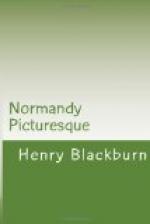In the course of our journey through Normandy, we have not said much about modern paintings, but at Rouen we are reminded that there are many French artists hard at work. The most prominent painters are those of the school of Edouard Frere, who depict scenes of cottage life, with the earnestness, if not always with the elevated sentiment of Mason, Walker, and other, younger, English painters. The works of many of these French artists are familiar to us in England, and we need not allude to them further; but there is an exhibition of water-colour drawings at Rouen, about which we must say a word.[51]
These sketches of towns in Normandy, and of pastoral scenes, have a curious family likeness, and a mannerism which the French may call ‘chic,’ but which we are inclined to attribute to want of power and patient study. There is an old-fashioned formality in the composition of their landscapes, which does not seem to our eyes to belong to the world of to-day, and a decidedly amateurish treatment which is surprising. They repeat themselves and each other, without end, and evidently are thinking more about Beranger than the places of which he sang; they would seek (as some one expresses it) to ’reconcile literal facts with rapturous harmonies,’ in short they attempt too much, and accomplish too little. In form and feature, these pictures remind us (like Rouen itself) of a bygone time, when travelling on the Continent was difficult and expensive, and views of foreign towns were not easy to obtain; when some distinguished amateur (distinguished, perhaps, more for his courage and industry than for his art) visited the Continent at rare intervals, and brought home in triumph a few hazy sketches of a people that we had scarce heard of, and hardly believed in; and had them engraved and multiplied, for the art-loving amongst us, as the best treasures of the time.
The modernised aspect of Rouen is one that we (as lookers-on merely) shall never cease to regret, because it is the town of all others which should tell us most of the past; and it is, moreover, the one town in Normandy which most English people find time to see.
But if most of its individuality and character have vanished, its sanitary condition and its wealth, have, we must admit, improved greatly under the new regime. ’When I walk through the enormous streets and boulevards of new Paris,’ says a well-known writer, ’I feel appalled by the change, but unable to dispute with it mentally, for it bears the imprint of an idea which is becoming dominant over Europe. For the moment the individuality of man as expressed in his dwelling (as in the house in our frontispiece) is gone—suppressed. The human creature no longer builds for himself, decorates for himself; no longer lets loose his fancy, his humour, his notions of the fitting and the comfortable. Science and economy go hand in hand, and lay down his streets and erect his houses.’ Thus, although, from




